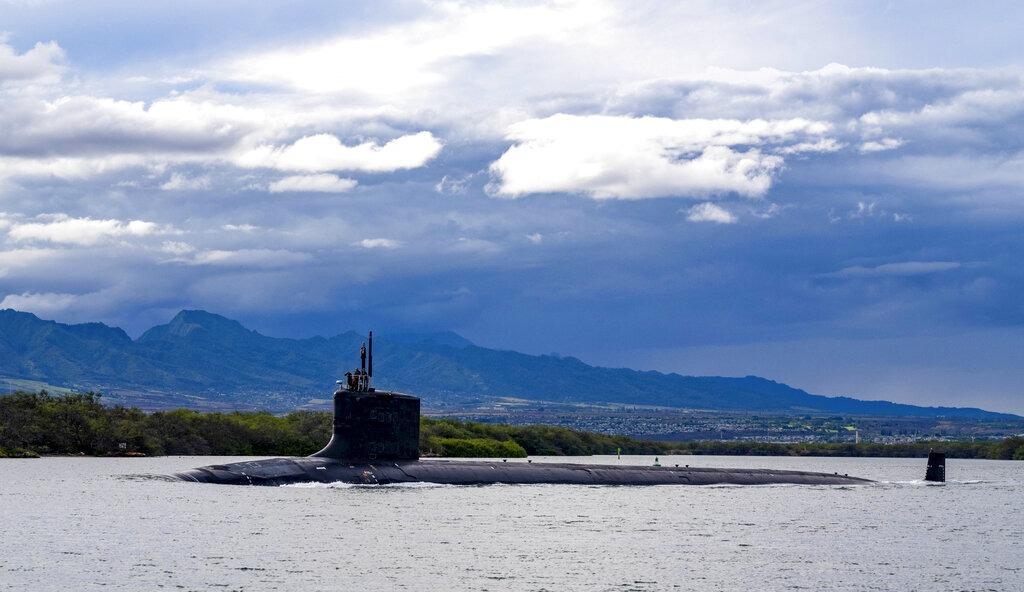 In this photo provided by US Navy, the Virginia-class fast-attack submarine USS Missouri (SSN 780) departs Joint Base Pearl Harbor-Hickam for a scheduled deployment in the 7th Fleet area of responsibility, Sept 1, 2021. (CHIEF MASS COMMUNICATION SPECIALIST AMANDA R GRAY / US NAVY VIA AP)
In this photo provided by US Navy, the Virginia-class fast-attack submarine USS Missouri (SSN 780) departs Joint Base Pearl Harbor-Hickam for a scheduled deployment in the 7th Fleet area of responsibility, Sept 1, 2021. (CHIEF MASS COMMUNICATION SPECIALIST AMANDA R GRAY / US NAVY VIA AP)
Doubts have surfaced over the future of a much-vaunted plan for Australia to buy a new fleet of nuclear-powered submarines from the United States and the United Kingdom.
The announcement of the multi-billion dollar deal in September last year was heralded as a key component of the new Australia, UK and US, or AUKUS, strategic partnership. This plan has met with opposition from neighboring countries and is accused of breaking international norms on nuclear non-proliferation.
But a year on from the announcement, it is becoming increasingly unclear whether Australia has the industrial capacity, or technical expertise, to build the new submarines, whether the US and UK are in a position to sell them given the changed geo-political landscape, and whether Australian can afford to pay.
This is despite the fact that on Sept 26, Peter Malinauska, the premier of South Australia, told journalists the federal government had reassured him the submarines will be built in his state.
READ MORE: China reiterates concerns over AUKUS nuke material transfer
Since the deal was announced, two of the three leaders of the countries involved – Britain’s Boris Johnson and Australia’s Scott Morrison – have lost their jobs and concerns have been voiced that the deal had never actually been a certainty.
With a price tag of A$190 billion ($121.55 billion) plus for eight nuclear submarines, it is looking doubtful especially in the current economic climate.
The proposed deal also angered France which had a A$90-billion deal with Australia to build a new fleet of conventional submarines to replace Australia’s six aging diesel-powered Collins Class vessels.
It is believed the Australian government will pay French shipbuilder Naval Group A$835 million in compensation.
Former South Australian senator and submariner Rex Patrick said, “The US engage in operations all around the world and they’re important operations and the US Navy is not going to cede a capability so that Australia can get submarines [so they can] dip their toe in the water.”
Also, the US is having trouble meeting its own building program for nuclear submarines.
This issue was highlighted on Sept 1 when Rear Admiral Scott Pappano, the executive officer for the US strategic submarines program, was questioned about America's shipbuilding workforce and the implications of the partnership with Australia.
Pappano said the plan could hamper his nation's own nuclear submarine program, as well as the United Kingdom's.
“If we were going to add additional submarine construction to our industrial base, that would be detrimental to us right now,” he said.
Another problem is the nuclear technology used by the US is highly secretive, and it is doubtful whether Congress will agree to allow the technology transfer even to a close ally like Australia.
It is also doubtful the UK could lend Australia a nuclear-powered submarine as it is only building seven Astute class before it moves to a new model.
“A year on, it is hard to think of a major defence or foreign policy initiative in living memory with such a stark divergence between what the public knows and what the government and its officials know,” said Sam Roggeveen director of the International Security Program at the Lowy Institute, an Australian-based think tank.
Writing in the Institute’s online magazine The Interpreter (September 13) he said: “Australians deserve to hear the detail. And more importantly, Australians need to hear from their government about how these submarines fit the nation’s military strategy and identity.
“Australia has always been a loyal US ally, but it has never before placed itself at the forefront of US planning for a confrontation with a superpower. And it has never before gone so dramatically on the offensive in its weapons acquisition, buying a weapon expressly designed to hem in China’s navy.”
“This is a question not just of military strategy but of how Australia defines itself as an international actor, and as a nation.”
In July two Chinese academic entities released a report saying the deal has set a “dangerous precedent” for the illegal transfer of weapons-grade nuclear materials and thus constitutes a blatant act of nuclear proliferation.
ASLO READ: Hard to conclude AUKUS partnership not engaged in nuclear proliferation
The report was released by the China Arms Control and Disarmament Association and the China Institute of Nuclear Industry Strategy.
The report says the AUKUS nuclear-powered submarine collaboration runs counter to the spirit of the South Pacific Nuclear Free Zone Treaty and also undermines ASEAN efforts to establish a nuclear weapon-free zone.
"The United States and Britain are directly giving Australia tonnes of weapon-grade nuclear materials. This is without a doubt an act of nuclear proliferation," said Zhang Yan, president of the China Arms Control and Disarmament Association.


